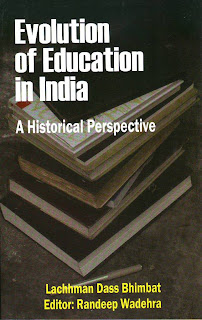Evolution of Education in India
By Lachhman Dass Bhimbat.
Ukay Publishing Co. Pages 132. Rs 295.
Reviewed by Satinder Kaur
Going by the bounteousness of this, India should have been the most advanced country in terms of education today, but reality is completely different. Despite its rich tradition, education in our country is in a mess. What went wrong and where? And most importantly, what can we do about it and how?
These are some of the questions raised by Lachhman Dass Bhimbat. He not only stops at questioning the present state of affairs but also goes on to find the answers. The book reveals his concern about fading rich traditions of the past and also expresses his keenness to control the damage already done to the system and infuses a fresh life into it.
Inculcating values in the students and turning the teachers into real nation-builders rather than mere salaried professionals are the two things which can go a long way in improving the entire education scenario, feels Bhimbat. Traversing through the entire journey of the Indian education system, starting from the tradition of gurukulas of the era 200 BC, ancient Buddhist viharas, medieval maktabs and madrasas, the author explores all facets of it before touching upon the modern system, which, he feels, is replete of ills and lacks the soul. Talking about the ills, he also gives reference to the efforts made by various individuals and institutions to remedy the situation, but without much success.
Although the debates on educational reforms have always been going on at various forums, the focus always remained on the material aspect ignoring the spiritual dimension altogether. The author argues for resurrecting the soul of the Indian education system and his suggestions seem to be quite relevant.
The cracks started appearing in the education system during Muslim rule and it ultimately crumbled during the British Raj. The author tells us how the actions of former alien rulers wrecked it from inside making it hollow for their selfish motives. He, however, seems to be showing light to rebuild the system in tune with our past traditions and the needs of the time rather than deriding the actions of these rulers.
Providing various perspectives on education, the book highlights the views of various educationists like Lala Hardayal and Swami Vivekananda besides giving a glimpse into the Soviet Russian and Japanese systems of education. Though the author throws sufficient light on the ancient and medieval, pre-British and even British-imposed systems of education, most part of the work is devoted to the proposed system of education.
Talking about the movement for national education as a reaction to the evils of the British education policy in India, Bhimbat says these institutions could not serve the purpose for which these were established as they had to submit to the government control. On the contrary, they did more harm to the country than good by giving birth to the sectarian strife.
Discussing Mahatma Gandhi’s views and his scheme of education which lays stress on handwork in detail, the author opines that it was just an ad hoc or emergency measure that could not be taken as a fully thought-out plan to meet the demands of the entire country. Although the scheme, he feels, was quite valuable, it dealt only with the primary education, which is not the only issue that the nation faces today.
The author also goes on to analyse the proposals of Sir John Sargent, the then Educational Adviser to the Viceroy. He provides forceful arguments to prove that the report was flawed and had a hidden agenda.
Written in a lucid style, the book makes a very interesting reading although the subject seems to be dry and stale. The footnotes act as a repository which enhance our knowledge. The book is a must read not only for the educationists but also for all those who are directly or indirectly involved with the system, particularly the policy makers who can get valuable inputs from exhaustive suggestions provided by the author.
Published in The Tribune dated 23/10/2011




No comments:
Post a Comment